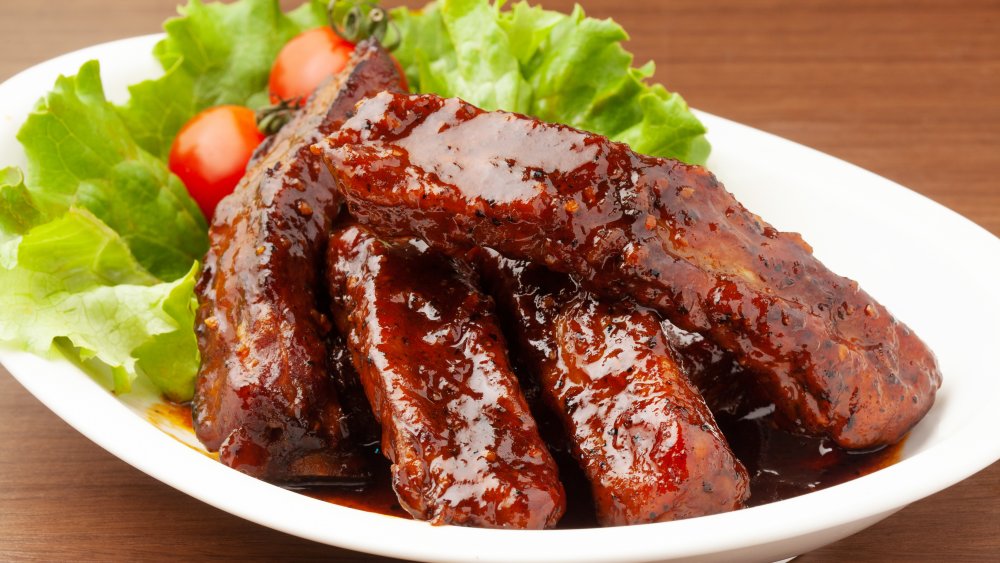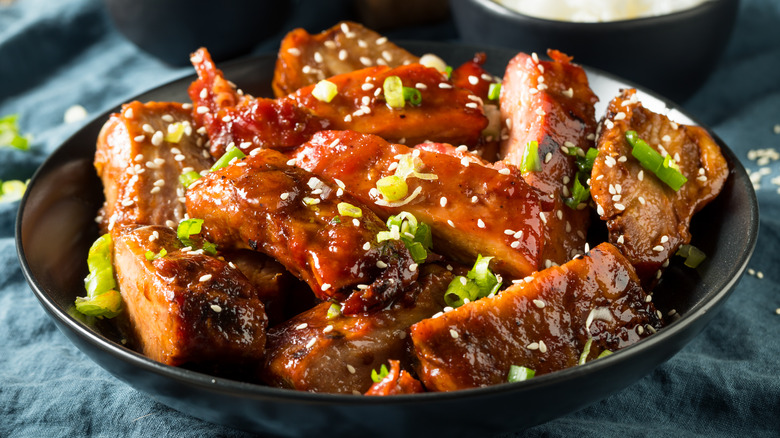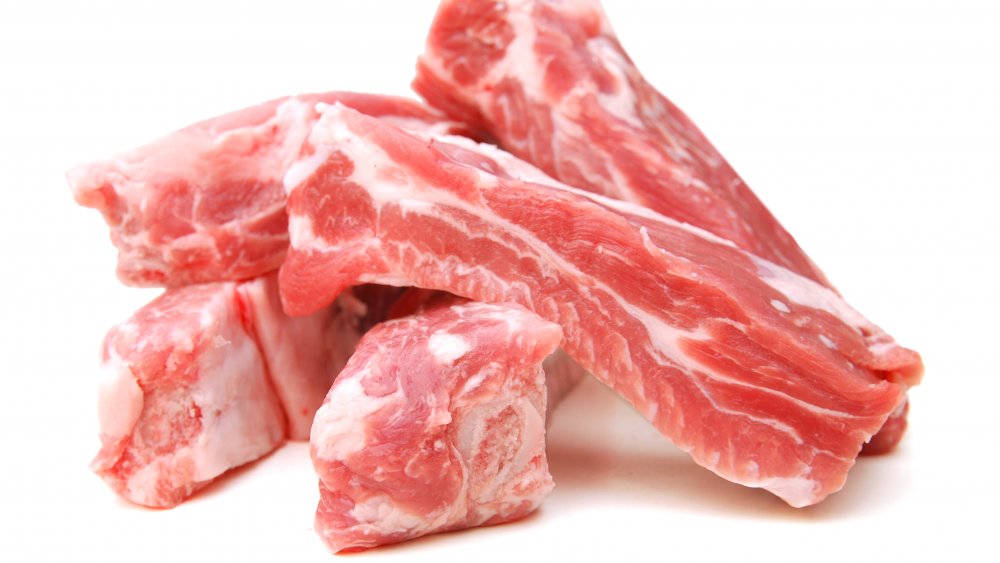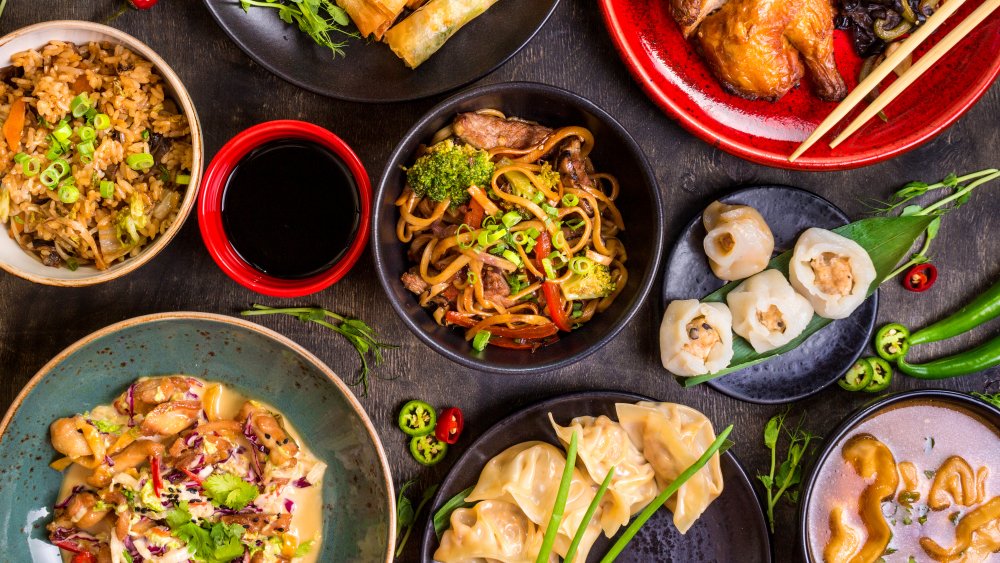You Should Never Order Spare Ribs At A Chinese Restaurant. Here's Why
We all have our favorite, go-to menu items when it comes to ordering Chinese food, most of them arriving on our plates or takeout containers glazed in sticky sauces and wrapped in crispy, fried coatings. These dishes are little luxuries most people probably don't normally prepare at home, and they are (of course) incredibly delicious. Another plus when ordering Chinese food from a restaurant — you're not saddled with a sink-load of dishes at the end of the night. (No matter what tips or tricks you use, deep frying is never a totally mess-free cooking method.)
However, not all Chinese restaurant menu items are created equal. Some are not even authentically Chinese (General Tso's chicken, for example), while others, like Chinese spare ribs, can unfortunately be considered a nutritional black hole. A fortune cookie couldn't even predict the excessive amount of fat and calories packed into this innocent looking side dish.
The nutritional facts
According to Livestrong, one 8-ounce serving of Chinese spare ribs clocks in at a whopping 949 calories. That's almost half of many adult's daily recommended caloric intake, according to the Dietary Guidelines for Americans, and it's only an appetizer! We're willing to bet these Chinese spare ribs are coming with and order of lo mein or fried rice as well, which are not exactly known as health foods.
Each serving also contains 7 grams of fat, which Livestrong says is the about the same amount you would find in 16 eggs, and 1,251 milligrams of sodium. For reference, the average recommended daily serving of sodium for adults is less than 2,300 milligrams, according to the FDA, meaning you're again almost half way to your daily total before you even get to the main course. We hope you went light on the salt during lunch. But what exactly makes this dish so over-the-top? Well, it's all in the ingredients.
Spare ribs contain a lot of natural fat
Let's take a look at the components of this Chinese-American classic: deep-fried pork spare ribs swimming in a sweet and savory sauce. It would be easy to assume the cooking method and that syrupy sauce are to blame for all the calories, sodium, and fat in this dish; However, the spare ribs themselves are actually responsible for two-thirds of the fat and calories, according to Calorie King. A 4-ounce portion of raw spare ribs contains 323 calories and 26 grams of fat. Double that to equal your traditional Chinese restaurant's 8-ounce serving, and you're looking at a whopper of an appetizer.
Spare ribs come from the underbelly of the pig and contain more fat than meat, which explains why we're so entranced by this dish. As King of the Coals reminds us, fat equals a whole lot of flavor. These things are delicious even before the take a dip in the deep-fryer. Then, on top of all that succulent fried pork goes the sauce. Many Chinese spare rib recipes, (like this one found on Food52) contain a combination of sherry, soy sauce, vinegar, and sugar. These ingredients are pretty innocuous on their own, but they can really pack on the calories and sodium when added to rich and fatty spare ribs.
There are healthier options at a Chinese restaurant
So, spare ribs might be at the top of the list of things to avoid at your local Chinese restaurant if you're concerned about your health, but they are sadly not the only dish that will throw off your diet. As The Daily Meal points out, other calorie-laden items, like the craveable classic fried egg rolls, sugary orange chicken, and the carb-filled lo mein, will likely need to be scratched from your list as well. (There are unfortunately a few reasons beyond the noodles that may cause you to pass on the lo mein.)
But we're not here to swing a wrecking ball through your Chinese food dreams! Nor is your only nutritious option steamed veggies and brown rice, sans soy sauce. Shrimp with lobster sauce, wonton soup, and beef and broccoli are all smart alternatives, according to Shape, and they're certainly more exciting than plain old veggies and rice.
If you're really in the mood for something saucy and indulgent (and you're up for doing the dishes), you may also want to consider making your own Chinese food at home, where you can better control the ingredients and the portion sizes. And for those days when only deep-fried pork, shellacked in sauce will do, an occasional order Chinese spare ribs probably won't kill you.



